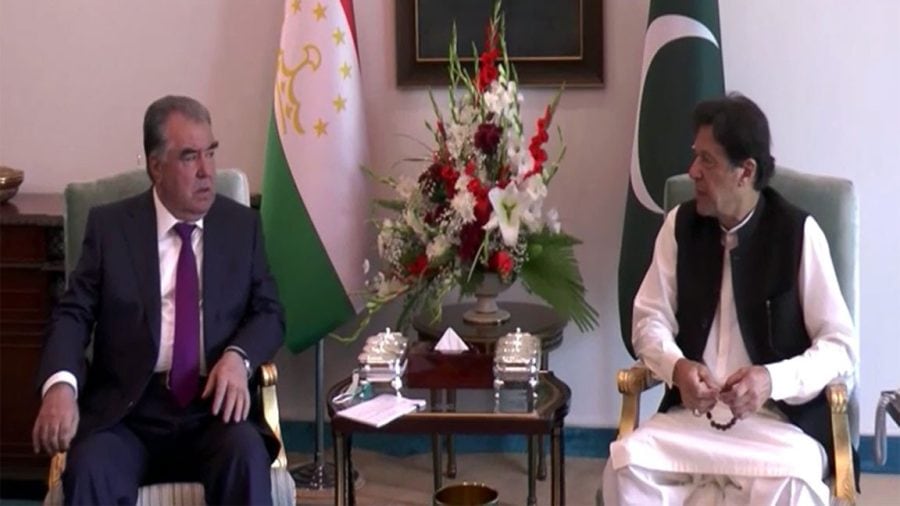During his meeting with visiting Tajik President Emomali Rahmon on Wednesday, Prime Minister Imran Khan welcomed Tajikistan to use Pakistan’s seaports and the China-Pakistan Economic Corridor (CPEC).
The prime minister restated Pakistan’s support for Tajikistan’s participation in the Quadrilateral Traffic-in-Transit Agreement during a joint press conference (QTTA). He further said that Pakistan was willing to supply Tajikistan arms.
President Rahmon came to Pakistan on a two-day visit. He had a one-on-one discussion with the prime minister, during which the two addressed the full range of bilateral connections as well as regional and international concerns.
According to a joint statement released after the meeting, Prime Minister Imran briefed President Rahmon of the Gwadar seaport’s operationalization and offered Tajikistan the use of Pakistani ports and the CPEC.
Imran emphasized that Pakistani seaports provided the most efficient and cost-effective connection to Central Asian nations, such as Tajikistan. Imran told a press conference that improving economic links were a main priority during the negotiations, adding that Gwadar Port could aid in improving trade and economic relationships with Tajikistan.
The two sides also spoke about cooperating in other areas, including as defense. Imran said that Pakistan was willing to supply guns to Tajikistan and that a memorandum of understanding (MoU) had been signed for this reason. He did not, however, give any specifics about the arms sales.
President Rahmon proposed to organize the joint working group to resolve transit trade difficulties as soon as possible and invited Afghanistan to attend its conference to enhance trade and commerce, with the goal of including the rest of the region.
Prime Minister Imran and President Rahmon expressed alarm about the possibility of Afghanistan devolving into civil conflict after the United States’ withdrawal from the war-torn nation, saying that such a scenario would be disastrous for both nations.
“We both share the concern that if there is no political settlement after the US withdrawal we fear Afghanistan may face the same situation as it had after the Soviet withdrawal,” the prime minister cautioned at a joint news conference with the Tajik president.
“This will not only affect our bilateral trade but also lead to terrorism,” Imran said.
Imran said he and Tajik President Emomali Rahmon shared this concern and that the only way to avoid anarchy in Afghanistan was for a political resolution to be reached. He also said that both countries have agreed to collaborate with other nations in order to avoid turmoil in Afghanistan.
The two leaders expressed their resolve to elevate bilateral ties to a new level of strategic cooperation for the mutual benefit of the two countries and their people, according to the joint statement, while expressing satisfaction with the steadily growing relations between Pakistan and Tajikistan.
At global fora such as the UN, OIC, ECO, and SCO, the two presidents expressed delight with their good bilateral collaboration. They pledged to continue to expand multilateral collaboration in the future for global and regional peace and prosperity.
To further expand bilateral commercial and economic connections, the two leaders emphasized the necessity of holding meetings of the Pakistan-Tajikistan Joint Commission on Trade, Economic, and Scientific-Technical Cooperation on a regular basis.
They emphasized the need for thorough execution and continuous monitoring of the committee’s conclusions. The Intergovernmental Commission’s next session will be held later this year, as promised.
The actions of many joint working groups (JWGs) formed to further improve the already expanding bilateral cooperation in numerous industries, including commerce, investment, transportation, energy, culture, and tourism, were observed with pleasure by the two presidents.
They emphasized the importance of the Joint Commercial Council (JBC) established between the two nations in fostering direct business ties, as well as the necessity for chambers of commerce and the private sector to attend its meetings on a regular basis. They also agreed to hold frequent trade exhibits and business forums in order to increase bilateral commerce.
The two presidents praised the progress made in the execution of Central Asia and South Asia (CASA)-1000 flagship power project and reaffirmed their commitment to completing it as soon as possible.
They agreed that if the project were to come true, energy interconnection would be established, resulting in wealth for everybody. They emphasized the need of using the tremendous untapped potential, especially in the fields of commerce, energy, connectivity, agriculture, and industry, for mutual benefit.
The two leaders emphasized the need of promoting people-to-people connections and enhancing collaboration in education, culture, and tourism via mutual development and collaborative partnerships.
Both parties emphasized the significance of road, rail, and air linkages between the two nations in promoting bilateral and regional connectivity, and they agreed to strengthen current infrastructure and investigate new possibilities for boosting rail, road, and air connectivity.










